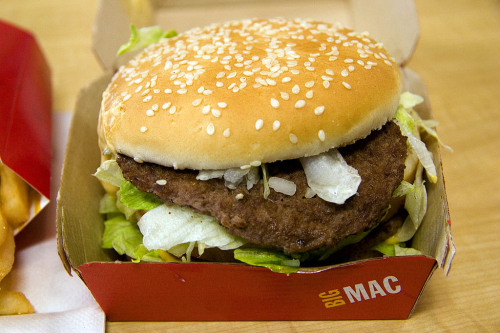Raw Story: Confronted by a 9-year-old girl during a shareholder’s meeting, the CEO of McDonald’s insisted that the company does not sell “junk food” and defended advertising practices that target children with colorful characters.In 2012, McDonald’s put the nutrional information for their menu online and we learned that the Premium Southwest Salad with Crispy Chicken had more calories than a double cheeseburger — so maybe bragging up the “healthy” salads isn’t a great idea.
“Something I don’t think is fair is when big companies try to trick kids into eating food that isn’t good for them by using toys and cartoon characters,” 9-year-old Hannah Robertson told McDonald’s CEO Don Thompson. “If parents haven’t taught their kids about healthy eating then the kids probably believe that junk food is good for them because it might taste good.”
“It would be nice if you stopped trying to trick kids into wanting to eat your food all the time,” the younger Robertson told Thompson, reading from a prepared statement. “I make cooking videos with my mom that show kids that eating healthy can be fun and yummy. We teach them that eating a rainbow of fruits and veggies makes kids healthier, smarter and happier because that is the truth.”
Thompson seemed to balk at Robertson’s question and scolded her. “First of all, we don’t sell junk food, Hannah,” he said. “My kids also eat McDonald’s. When they were about your size, to my son who is with us today, who was a little bit bigger, he was a football player, and also they cook with me at home. I love to cook. We cook lots of fruits and veggies at home.” He added that the company wants to sell more fruits and veggies, and pointed out their salad selection and the inclusion of apple slices in Happy Meals.
McDonald’s faces increasing criticism for marketing their food to children. One is reminded of Camel cigarette’s “Joe Camel” marketing campaign which used a cartoon character. According to the report, “McDonalds faced a lawsuit in 2010 over marketing processed foods loaded with salt and fat to children through the use of toys and cartoon characters, which the Center for Science in the Public Interest (CSPI) calls deceptive, and a main driver of the childhood obesity epidemic in the U.S.” That lawsuit was defeated in 2012, but this has done nothing to silence the criticism.
[photo by pointnshoot]






